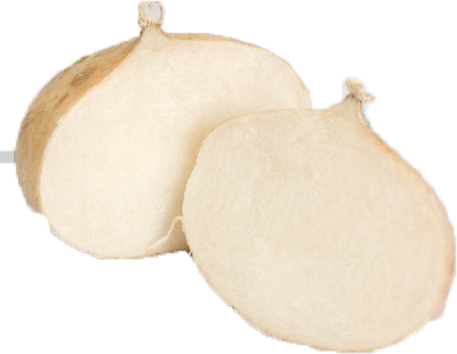|
Jicama is very
low calorie root vegetables; contains only 35 calories per 100 g. However, its
high quality phyto-nutrition profile comprises of dietary fibre, and
anti-oxidants, in addition to small proportions of minerals, and vitamins.
It is one of the
finest source dietary fibre and excellent source of oligo fructose inulin, a
soluble dietary fibre. The root pulp provides 4.9 mg or 13% of fibre. Inulin is
a zero calorie, sweet inert carbohydrate and does not metabolize in the human
body, which make the root an ideal sweet snack for diabetics and dieters.
As in turnips,
fresh yam bean tubers are rich in vitamin C; provide about 20.2 mg or 34% of
DRA of vitamin C per 100 g. Vitamin-C is a powerful water-soluble anti-oxidant
that helps body scavenge harmful free radicals, thereby offers protection from
cancers, inflammation and viral cough and cold.
It also contains
small levels of some of valuable B-complex group of vitamins such as folates,
riboflavin, pyridoxine, pantothenic acid and thiamin.
Further, it provides
healthy amounts of some important minerals like magnesium, copper, iron and
manganese.
Digestion: One of the most important elements of jicama is the high levels
of dietary fibre that it contains. Dietary fibre helps to boost the bulk of
stool, thereby helping it move through the digestive tract and reducing
conditions like constipation. Furthermore, jicama is a rich source of a
particular soluble fibre called oligo fructose inulin, which is a sweet, inert
carbohydrate that does not metabolize into simple sugars. This means that for
diabetic patients, jicama can be a great way to have some sweet food without
worrying about the blood sugar fluctuation that is usually a result.
Immune System: There is a very large amount of vitamin C found in jicama; 100
grams of jicama is approximately 40% of our entire daily requirement for
ascorbic acid. Vitamin C is an essential part of our immune system health and
stimulates the white blood cells, which are the body’s first main line of defence
against illness. Battling bacterial, viral, fungal, or pathogenic diseases is
greatly helped by adding vitamin C to your body. Also, the antioxidant
potential of vitamin C means that it helps in the fight against cancer by
neutralizing the effects of free radicals that have been connected with heart
disease and cancer. Free radicals are found in the body as a result of cellular
metabolism.
Blood Pressure: As a rich source of potassium, jicama is able to help manage
blood pressure, since it is a vasodilator and reduces the tension on blood
vessels and arteries, thereby lowering the stress on the cardiovascular system.
Potassium is also essential for maintaining fluid balance in opposition to
sodium throughout the body, thereby keeping our bodies hydrated and functioning
at a high level.
Circulation: The significant amounts of copper and iron found in jicama make
it very good for maintaining the health of the circulatory system, since those
two minerals are important elements of red blood cells. Without those
components, people suffer from anaemia and low functioning of the organs that
require fresh, oxygenated blood to properly function.
Brain Function: Vitamin B6 has been linked to increased brain function and
cognitive abilities, and jicama has this vitamin is significant amounts.
Furthermore, vitamin B6 is integral in breaking down proteins into usable amino
acids and other forms of protein for humans. This maximizes the metabolic
processes and efficiency of various organ systems.
Strong Bones: The levels of minerals like manganese, magnesium, iron, and
copper found in jicama mean that this root vegetable can be a major booster for
our bone mineral density. These minerals are essential for building strong, new
bones and healing any damage to existing bones. This is also the best way to
prevent the onset of conditions like osteoporosis, which millions of people
suffer from all over the world.
Weight Management: Low-calorie foods are very important for those trying to lose
weight, especially when those low-calorie foods are also packed with nutrients
and dietary fibre to make your body feel full. Jicama only has 35 calories per
100 grams, and is clearly filled with nutrients and fibre. Jicama is an
excellent snack to reduce your appetite and curb cravings, without gaining any
weight or losing any nutritional benefits.
A Few Words of Caution: As mentioned earlier, the root of jicama is edible, but the rest
of the plant is highly toxic. Be careful not to eat the seed pods, leaves, or
vines. Other than that, jicama is a healthy choice that can bring you a number
of benefits!
|

